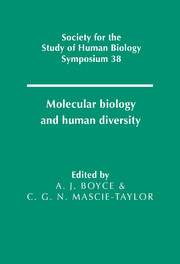Book contents
- Frontmatter
- Contents
- List of contributors
- Preface
- 1 Mitochondrial DNA in ancient and modern humans
- 2 Digital DNA typing of human paternal lineages
- 3 Minisatellites as tools for population genetic analysis
- 4 DNA fingerprinting: development of a technology and its application to the study of human populations
- 5 Kinship, inbreeding, and matching probabilities
- 6 Using the coalescent to interpret gene trees
- 7 Some attempts at measuring natural selection by malaria
- 8 AIDA: Geographical patterns of DNA diversity investigated by autocorrelation statistics
- 9 Mitochondrial DNA sequences in Europe: an insight into population history
- 10 Palaeolithic and neolithic contributions to the European mitochondrial gene pool
- 11 The molecular diversity of the Niokholo Mandenkalu from Eastern Senegal: an insight into West Africa genetic history
- 12 The peopling of Madagascar
- 13 Molecular perspectives on the colonisation of the Pacific
- 14 Population ancestry on Tristan da Cunha–the evidence of the individual
- 15 Linguistic divergence and genetic evolution: a molecular perspective from the New World
- 16 Allelic sequence diversity at the human β-globin locus
- 17 A nuclear perspective on human evolution
- 18 Contrasting gene trees and population trees of the evolution of modern humans
- 19 Methods and models for understanding human diversity
- Index
19 - Methods and models for understanding human diversity
Published online by Cambridge University Press: 19 September 2009
- Frontmatter
- Contents
- List of contributors
- Preface
- 1 Mitochondrial DNA in ancient and modern humans
- 2 Digital DNA typing of human paternal lineages
- 3 Minisatellites as tools for population genetic analysis
- 4 DNA fingerprinting: development of a technology and its application to the study of human populations
- 5 Kinship, inbreeding, and matching probabilities
- 6 Using the coalescent to interpret gene trees
- 7 Some attempts at measuring natural selection by malaria
- 8 AIDA: Geographical patterns of DNA diversity investigated by autocorrelation statistics
- 9 Mitochondrial DNA sequences in Europe: an insight into population history
- 10 Palaeolithic and neolithic contributions to the European mitochondrial gene pool
- 11 The molecular diversity of the Niokholo Mandenkalu from Eastern Senegal: an insight into West Africa genetic history
- 12 The peopling of Madagascar
- 13 Molecular perspectives on the colonisation of the Pacific
- 14 Population ancestry on Tristan da Cunha–the evidence of the individual
- 15 Linguistic divergence and genetic evolution: a molecular perspective from the New World
- 16 Allelic sequence diversity at the human β-globin locus
- 17 A nuclear perspective on human evolution
- 18 Contrasting gene trees and population trees of the evolution of modern humans
- 19 Methods and models for understanding human diversity
- Index
Summary
Introduction
The study of modern human origins and the study of human variation are the same, since they both refer to processes by which contemporary human diversity developed. There is no shortage of discussion in the literature about competing models of human origins, so we will summarize current viewpoints in a cursory way, then discuss several testable hypotheses suggested by these viewpoints. After that, we describe several relatively unexplored ways of looking at human molecular data and evaluate the merits and possibilities of new and older methods.
We try to distinguish between what we call population perspectives and phylogenetic perspectives. These perspectives descend from the population genetics of the last several decades, in which distinct anthropological and biological traditions developed. The anthropological tradition, summarized, for example, in Crawford and Mielke (1980), was concerned with local differentiation of populations driven by gene flow and drift. The biological tradition, summarized for example in Nei (1987), was concerned with species differences and mutations, especially neutral mutations. Our current interest in global human origins and dispersions calls for a blend of these traditions both in theory and in techniques of data analysis and presentation. Anthropologists should learn how to put mutations in their models, and biologists should stop treating human groups as if they were species.
- Type
- Chapter
- Information
- Molecular Biology and Human Diversity , pp. 283 - 299Publisher: Cambridge University PressPrint publication year: 1996
- 23
- Cited by



